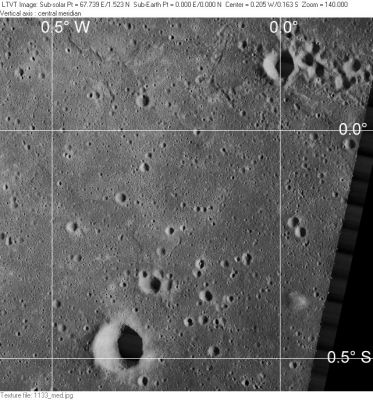Oppolzer A
Contents
Oppolzer A
|
Lat: 0.5°S, Long: 0.3°W, Diam: 3 km, Depth: 0.61 km, Rükl: 44 |
LO-I-133M Oppolzer A is the crater in the lower left. The intersection of the grid lines in the upper right is the center of the "Mean-Earth/Polar" system of lunar coordinates, that is, the location on the Moon which, on average, points towards the center of the Earth.
Images
LPOD Photo Gallery Lunar Orbiter Images
- see Oppolzer for additional Lunar Orbiter images
Maps
(LAC zone 77A2) LAC map Geologic map LM map AIC map
USGS Geologic Map of the Oppolzer A Region of the Moon (I-620)
USGS Geologic Map of Apollo Landing Sites 3 and 3R (I-621) (part of Oppolzer A region, Sinus Medii, with the approximate landing site of Surveyor 6 near the left margin of the map).
Description
Oppolzer A is a rather ordinary 3.28 km diameter crater with a slightly raised rim, sloping walls and a small flat floor. It is notable primarily for being the closest IAU-named feature to the origin of the Mean-Earth/Polar lunar coordinate system -- the one most commonly used for expressing positions on the Moon. In this system, the zero-point of longitude and latitude is that point on the Moon which, on average, faces the Earth's center. Oppolzer A is slightly over 18 km (0.6 degrees) from that point, the next closest named feature being Bruce, which is about 37 km (1.2 degrees) on the opposite side of the mean center.
Description: Wikipedia
Additional Information
- Depth data from Kurt Fisher database
- Arthur, 1974: 0.61 km
- From the shadows in LO-I-133M, Oppolzer A is 610-660 m deep. The unnamed 2 km diameter crater in the upper right, about 4.3 km north of the mean-Earth point, is 390-440 m deep. - Jim Mosher
- The location of the mean-Earth point was traditionally determined by monitoring the apparent longitude and latitude of Mösting A, a crater readily visible over a wide range of sun angles. A long enough average would give its position relative to the mean center; and hence the position of the center could be determined by its offset from Mösting A (rather than the much closer Oppolzer A).
- The present image shows the Moon’s equator (0° latitude) tangent to the south edge of a 370 m diameter crater straddling the central meridian (0° longitude). In other words, the present calibration places the mean-Earth point on the south rim of this little crater.
- However, the grid lines shown here could easily be misplaced by about 0.01 degrees with respect to the true mean-Earth grid lines. The registration of the present image is based on more distant points of the 1994 ULCN and places the center of Oppolzer A's 3.28 km circular rim at 0.476° S/ 0.356° W (18.03 km or 0.59 degrees from center of the coordinate grid). This does not match perfectly the actual coordinates of Oppolzer A given in the 1994 ULCN (where it is control point #605) of 0.487 S/ 0.352 W (18.23 km or 0.60 degrees from the center). Nor does it agree with the more recent, but not necessarily more accurate, ULCN 2005, which places the center of Oppolzer A at 0.492° S/ 0.360° W (18.49 km or 0.61 degrees from the center of the grid system). There is no reason to think any of these values are better than any of the others, but if the ULCN 2005 position of Oppolzer A is correct, then the grid lines shown here should be shifted up (northward) by 0.016 degrees (0.49 km), and to the right (westward) by 0.004 degrees (0.12 km).
- The ULCN 2005 data for the center of Oppolzer A would then place the mean-Earth point essentially on the north rim of the 370 m crater (rather than the south rim, as shown), while the 1994 ULCN would place it closer to the center of that little crater.
- Because of the Moon's librations, the apparent center of the Moon's disk (as seen from Earth) is constantly shifting and can easily be as much as 10 degrees away from the mean center (the intersection of the grid lines). In fact, because the Moon appears to oscillate in both axes, the apparent center tends to move in something like a circle about this point, and it would be rare, indeed, to see this point pointed exactly towards you.
Mirror on the moon and possible visibility of the sun's minute starlike reflection through telescopes on earth
Nomenclature
- Named after the nearby crater Oppolzer.
LPOD Articles
Bibliography
